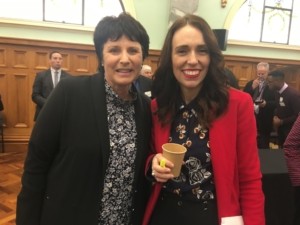Ten years ago Nicky Skerman completed her Master of Nursing degree at EIT. Little did she know that her research thesis would become nationally recognised and make it into Prime Minister Jacinda Ardern’s Wellbeing Budget 2019.
Nicky grew up in Palmerston North and worked as a Plunket nurse until she had her four children. After years of being a full-time-mother, she decided to upskill. Nicky completed two post graduate papers in the School of Nursing at EIT, then progressed to gain a master’s degree.
For her master’s thesis Nicky interviewed 21 teenage mothers asking them what they wanted from the Well Child/Tamariki Ora (WC/TO) service. She surveyed what these mothers liked and didn’t like about services which they had experienced after their midwifery care had finished.
Nicky found that they were not well engaged with the Well Child services. They said that their parenting needs weren’t met. They wanted someone who cared and whom they could trust and have a relationship with for potentially the first five years of their children’s lives.
Realising how significant her findings were, Nicky alongside Plunket, applied for a Vodafone Foundation World of Difference scholarship. She was granted $80,000 to start a pilot programme for teen mothers based on her thesis recommendations.
“What we did was very simple but it made a huge difference to young mothers,” Nicky explains. In addition to the midwife visits the women were seen three times by one consistent Plunket nurse, twice in the late antenatal period and then again before their babies were two weeks old.
The relationship the nurse developed with the mother through these extra visits meant that trust was gained early. In many cases, the nurse could connect the mothers with other health and social services as needed.
The outcomes of the pilot programme were evaluated by EIT academic staff/researchers Kathy Manhire, Dr Sally Abel and Dr Shona Thompson, when the children were six months old and then again when they turned three. Comparing these results with data collected from a control group, the evaluation team found those in the pilot programme had higher breastfeeding and immunisation rates.
Of most significance, the young women established good relationships with the nurse. The mums were more satisfied with the WC/TO services and made more use of other health and social services. They liked the flexibility, reliable support and availability and they didn’t feel judged.
Nicky’s recommendations, such as allocating one designated WC/TO nurse to teenage mothers, continued to create a buzz outside of Hawke’s Bay.
Much to the satisfaction of everyone involved, Nicky’s programme has recently been granted ten million dollars of funding in Prime Minister Jacinda Ardern’s Wellbeing Budget. In her budget speech the Prime Minister stressed the significance of early intervention. “I believe in the power of relationships. I believe that when mothers are supported and given the best chance possible they and their children will thrive. The best place to start is with mothers,” Jacinda stated.
Although the odds are against these young mothers, outcomes can be very positive if they are well supported.
“It is unbelievable that after all these years the programme is now recognised nationwide,” says Nicky. “We are not going to change the world, but establishing a good relationship between the nurse and the young mums is definitely a starting point.”

